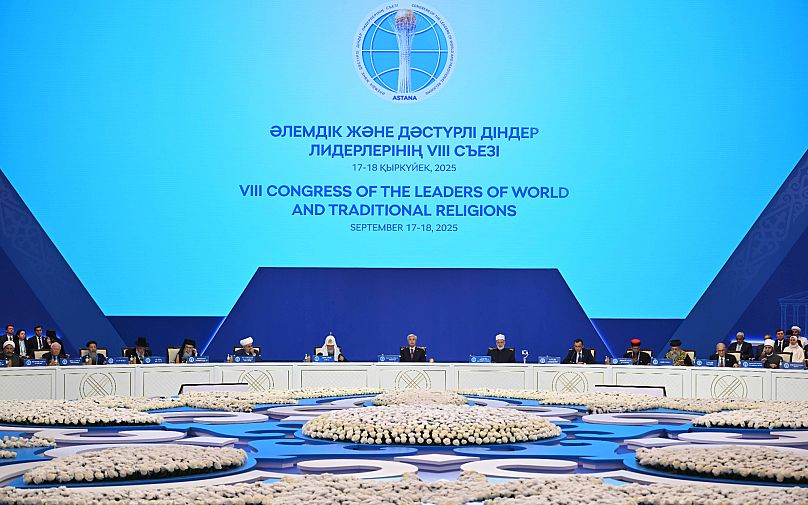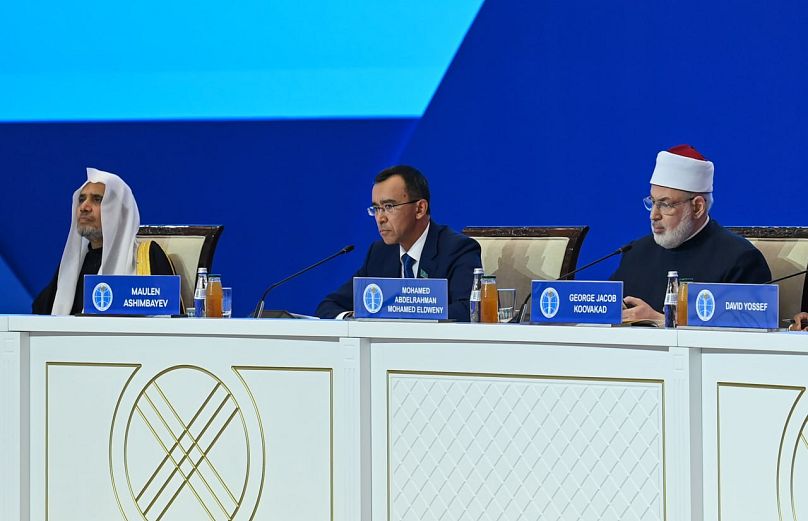Religious leaders condemned the violence in Gaza and Ukraine, while underlining the need for dialogue and mutual respect at a religious congress in Astana.
The wars in Ukraine and Gaza, the mounting death tolls, and the atrocities committed there were the dominant themes at the eighth Congress of the Leaders of World and Traditional Religions held in Kazakhstan's capital Astana.
More than 100 representatives of Catholicism, Islam, Judaism, Buddhism, Daoism, Orthodox Christianity, Shintoism and other faiths gathered on 17 and 18 September to deliberate on religion’s role in today’s turbulent world.
Speakers condemned violence, rejected the abuse of religion for political ends, and called for mutual respect and dialogue.
Speaking at the congress, Kazakh President Kassym-Jomart Tokayev expressed concern over growing tension and polarisation in various countries and hoped religious leaders could be the bridge to connect people.
“The role of this Congress of Leaders of World and Traditional Religions is exceptional. Despite differences in faith and traditions, we are all united by common aspirations and good intentions,” he said.
While Ukraine was less frequently addressed than Gaza, Middle Eastern delegates were the most vocal about the Israel-Hamas war in the Strip.
Dr Mohammed Abdulkarim Al-Issa, Secretary General of the Muslim World League, called the violence in Gaza “shameful” and urged recognition of Palestine’s independence. Ashkenazi Chief Rabbi of Israel Kalman Meir Ber stressed that the conflict is not religious in nature.
“I want to emphasise before the forum: this war is not religious. Judaism is not against any religion; on the contrary, we have published several appeals calling for respect for every faith, everyone, and their path,” he said.
Head of the Congress Secretariat and Kazakhstan’s Senate Speaker Maulen Ashimbayev highlighted that even though some of the religious leaders gathered there were from nations at war, they managed to have the conversation calmly and constructively.
Religion’s role in a 'post-secular' era
The central message of the congress was that interfaith dialogue must be a driving force for peace. Speakers stressed that religion has the power to unite people in an increasingly fractured world.
“I am confident that religious leaders will do everything possible to prevent the world from sliding into the abyss of chaos, reminding many politicians of common sense, goodwill and moral responsibility,” said President Tokayev in his speech.
He noted the growing role of religion today and emphasised that we are entering a new post-secular era, where religion will once again play a vital role in social and political spheres.
“Kazakhstan thinks that spiritual diplomacy could be an effective instrument because spiritual diplomacy has a huge potential. Around 80% of the world's population identify themselves with a religious organisation,” added Maulen Ashimbayev.
Pope Leo XIV, in a message to participants, emphasised religion’s unifying mission. “Every authentic religious impulse fosters dialogue and cooperation, grounded in our innate awareness of the interdependence that binds individuals and nations,” he wrote.
“From this perspective, working together in harmony is not merely a pragmatic choice, but a reflection of the deeper order of reality.”
Alongside conflict and the role of religion, the congress tackled global challenges such as climate change, inequality and artificial intelligence. Leaders underlined the moral duty to combat environmental degradation, the importance of education in preventing radicalisation, and the need for ethical use of new technologies.
Tokayev suggested drafting a joint document on the role of faith leaders in tackling climate change, and creating an interfaith commission on AI ethics to develop universal principles for the responsible use of emerging technologies.
He also proposed launching a “Movement for Peace” under the congress auspices, with religious leaders serving as its moral core in promoting non-violence and dialogue.
Participants determined that the ninth congress will take place in 2028. Astana will be the host, as it has been since the first congress in 2003.
Throughout eight meetings, Kazakhstan has been bringing together high-level religious leaders, such as Pope Francis, Patriarch Kirill of Moscow and Grand Imam of al-Azhar Ahmed el-Tayeb.
to promote peace, eradicate extremism and strengthen ties between religions and cultures.
Safeguarding of religious sites
As part of the congress this year, the United Nations Alliance of Civilisations (UNAOC) held a special session on safeguarding religious sites, chaired by UNAOC High Representative Miguel Ángel Moratinos.
Speakers advocated for urgent and coordinated action to protect places of worship from vandalism, targeted attacks and neglect. They stressed that protecting religious sites requires legislative actions, technical preservation, community engagement and rapid-response measures.
The wars in Gaza and Ukraine were again highlighted, as they threaten not only lives but also religious heritage.
“While we protect the holy places of others, we can hope others will protect our holy places,” noted Rabbi David Antebi Sacca.













